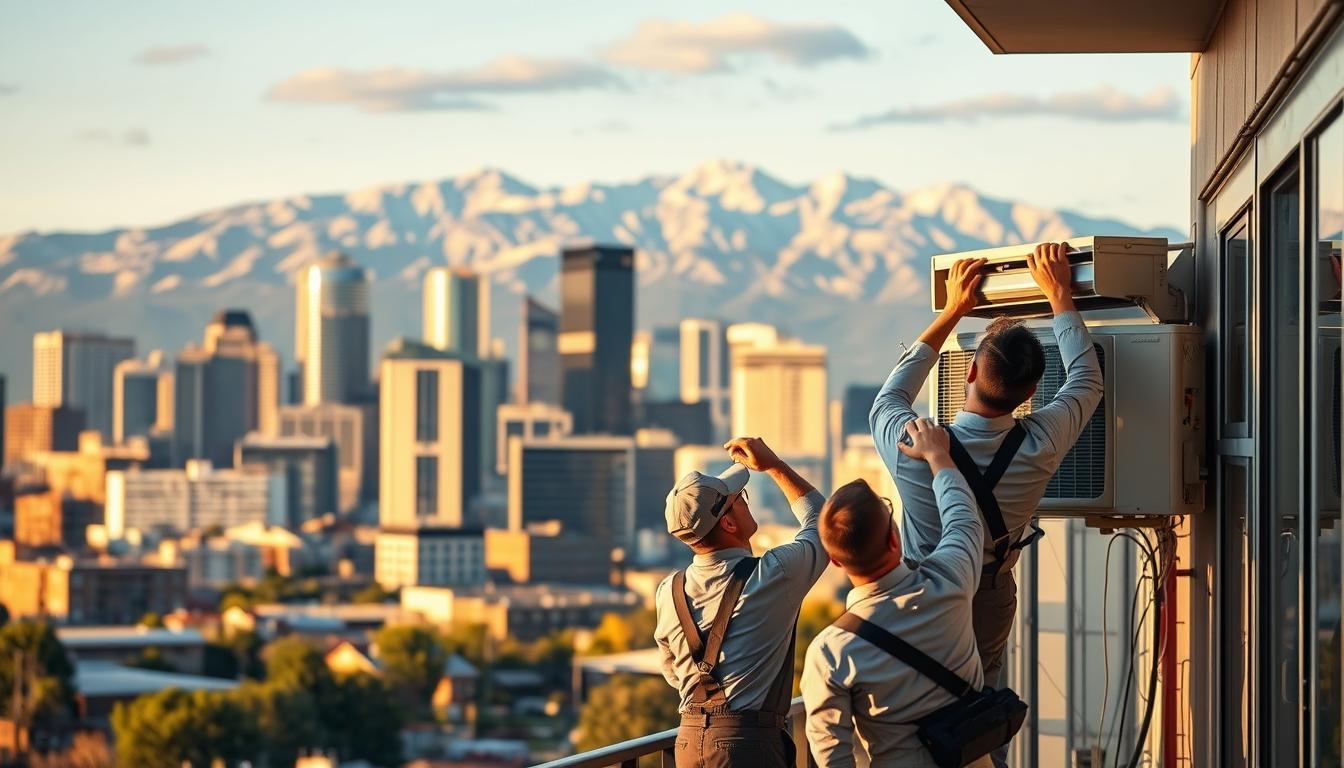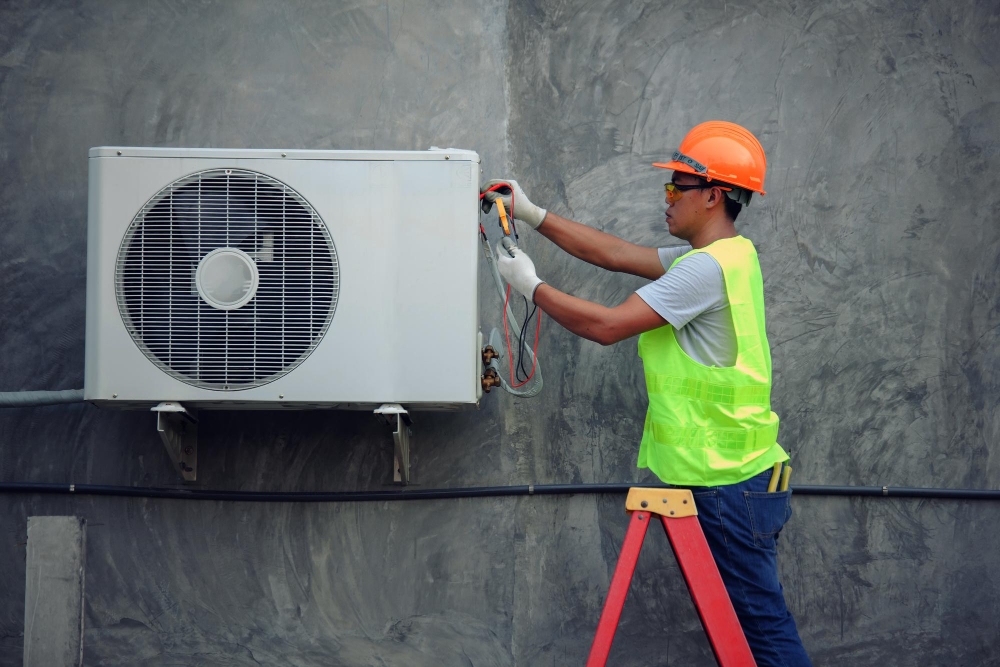Life in Denver can present some unique challenges you’ve got to be ready for when it comes to the weather. One day you can experience sunshine in the 70s and the next wake up with a foot of snow on the ground! Because of this unpredictability, it is essential to choose an HVAC contractor who can keep you comfortable in your home and your family happy.
After working with hundreds of Denver families over the years, I can tell you that when it comes to heating and cooling, the difference between being comfortable in your home versus feeling frustration simply comes down to the person maintaining that system.
Table of Contents
ToggleWhat Makes Denver’s Climate So Challenging for HVAC Systems
Denver’s climate isn’t like most other cities. At 5,280 feet, we’re dealing with thin air, high UV exposure, and temperature fluctuations that can vary 40 degrees in a day. Our semi-arid climate brings low humidity into play all year long, and that affects your HVAC system’s operation and feel in your home.
These are more than just interesting facts about our weather they affect your heating and cooling needs. A system in Houston or Atlanta could be perfect but could be too much for you in the Mile High City. That is where local expertise really comes in.
How Altitude Affects Your HVAC System
At our altitude the air is thin; therefore, your system operates differently than at sea level. Airflow calculations change, the combustion process is different, and the equipment’s efficiency might vary appreciably. Contractors in this area who have been working in the Denver area for years can sense or know these types of intricacies.
The Real Advantages of Working with Local HVAC Professionals
If your furnace breaks on a night in January where it was 5 degrees outside, you definitely want to someone who can make it to you and fix it properly fast. What do you get from a local contractor:
They Know Your Neighborhood
Local contractors likely have experience working on homes similar to yours. They know the common problems with certain builders, the oddities of homes from different eras, and which systems will work best in different neighborhoods in Denver. This type of experience translates to accurate problem diagnoses and effective solutions.
A Flexible Service That Meets Your Needs
With national chains, the service is provided on the schedule of the corporate office and theirs is a standardized pricing model. A local contractor has more flexibility with their schedule, pricing, and service options. Do you need a repair appointment at 8 p.m. because you work irregular hours? Do you want a repair solution that you can afford? Local tradespeople can typically be more accommodating in these situations.
When You Need Emergency Help the Most
When severe weather hits Denver (and it will), the local contractors are already here. The local contractors are not dispatching a technician from a neighboring municipality or across the entire Denver/Mountain region. They reside in the same neighborhoods you do and understand that in February if your heater fails, it is not an inconvenience, it is an emergency.
You may read How to Choose a hvac Contractor?

Why Standardized National Solutions Fall Short in Denver
Big national HVAC companies have their place, but they’re built for efficiency and standardization, not customization. Their technicians rotate through different cities and regions, which means they might not have deep experience with Colorado’s specific challenges.
The Standardized Pricing Dilemma
Standardize your pricing seems fair until you start to realize that you are truly paying for services you are not utilizing, as well as kitchen sink overheads. Local contractors and HVAC educators can provide fair and reasonable A-B-C- quotations after understanding your needs, rather than their pre-determined maximum package for profit.
Education Gaps in Vertical Installation
Training and maintaining HVAC systems altitude is a special skill that a technician needs to learn. All combustion calculations, airflow, and efficiency ratings, need to be adjusted for our altitude, as a technician’s hands-on experience is at sea level.

How to Choose the Right HVAC Contractor in Denver
Since there are many options in the metro, considerable research is needed to find a company that fits your needs. The following are qualities to watch for:
Must Haves
Best practice includes that your contractor has current Colorado licenses and carry liability and workers’ compensation coverage insurance. Look for certifications from recognized entities, like NATE (North American Technician Excellence), along with manufacturer certifications for the equipment you currently have or want to have.
Don’t merely take their word for it ask to see documentation. Any reputable contractor will gladly provide documentation for your review.
The Significance of Local Reputation
See what your neighbors say. Look for reviews on Google, Yelp, Better Business Bureau, etc. How a contractor reacts/responds to negative reviews says a lot about their customer service perspective.
Ask the contractor if they can provide you with local references, customers you can call if you desired. A confident company will happily offer you names/numbers of provide you with names of satisfied customers in your area. This should direct credibility to the contractor.
Creating a Partnership, Not a Transaction
The best relationships in HVAC are partnerships over time. You want a contractor, who will come back for annual maintenance, for unanticipated repairs, and for system replacement in the inevitable future. A contractor that knows your system has knowledge of your system history, may help facilitate rare problems that exist return of your systems performance.
Ask potential contractors about their maintenance plans and long-term service options. Companies invested in ongoing relationships typically provide better value over time.
Conclusion
Selecting a local HVAC contractor is not merely about regional “buy local” pride. It is about better service, more appropriate solutions, and establishing a relationship with someone who understands the special needs of Denver.
At MileHi HVAC, we have built our business on understanding what Denver homeowners truly need. We are not just familiar with the technical side of heating and cooling we live here, we deal with the same weather you do, and we have service thousands of homes throughout the metro area.
When you call us at (720) 770-0055 or email geno@milehihvac.com you would be talking to someone who knows that the value of a properly functioning HVAC system in Denver is not a luxury, it is necessary for your comfort and safety. Therefore, MileHi HVAC provides solutions that are tailored to your space, budget, and needs because we know every home, and every family is different.
FAQ
What makes local contractors better than national chains?
Local contractors offer deeper knowledge of Denver’s climate, faster emergency response, more flexible service options, and personalized attention that national chains simply can’t match due to their standardized business models.
How do I verify a contractor’s credentials?
Check with the Colorado Department of Regulatory Agencies to verify licensing. Ask contractors directly for proof of insurance and certifications. Reputable companies will provide this information immediately.
Are local contractors more expensive?
Not necessarily. While hourly rates might be comparable, local contractors often provide better value through accurate diagnostics, appropriate solutions, and fewer return visits. They’re also more likely to offer flexible payment options.
What qualifications should I look for?
Ensure your contractor holds a valid Colorado HVAC license, carries adequate insurance, and has relevant certifications from organizations like NATE. Experience working at altitude is also crucial for proper installation and maintenance.
How can I find reliable local references?
Ask friends and neighbors for recommendations. Check online reviews across multiple platforms. Request references directly from contractors you’re considering. Join local Facebook groups or NextDoor to ask your community.
Why does altitude matter for HVAC systems?
Denver’s elevation affects air density, combustion processes, and system efficiency. Equipment must be properly adjusted and installed by technicians who understand these altitude-specific requirements.
How often should I have my system maintained?
Most experts recommend annual maintenance ideally before each heating and cooling season. Regular maintenance prevents breakdowns, improves efficiency, and extends your system’s lifespan.


